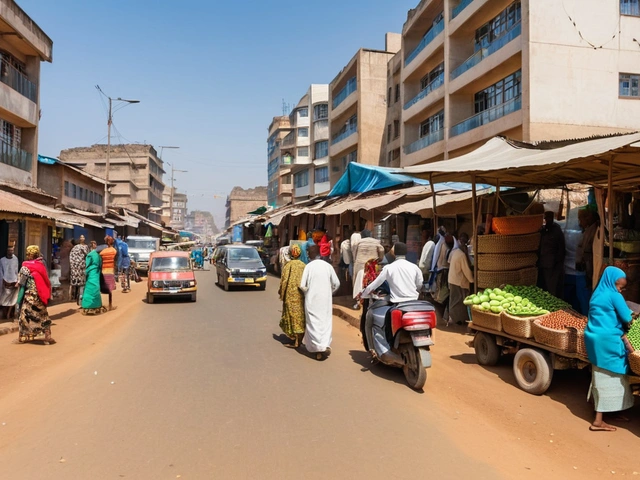When you think about Ethiopia, images of vast landscapes and cultural richness might come to mind. But have you ever wondered what a typical day looks like for the average Ethiopian worker? Understanding the common jobs in Ethiopia can offer a valuable perspective on the country's dynamic economic landscape.
Agriculture plays a significant role in the livelihoods of many Ethiopians. From planting coffee beans to tending livestock, the agricultural sector employs a large percentage of the population. Additionally, the manufacturing industry has been growing steadily, providing jobs in textiles, leather, and other goods.
The service sector is another critical area, ranging from retail and hospitality to transportation. Moreover, tourism is a booming industry in Ethiopia, given its rich history and numerous UNESCO World Heritage sites. As the world becomes more digital, an emerging tech scene, including startups, is sprouting in urban centers like Addis Ababa.
Finally, educational roles and government jobs provide stable employment opportunities for many. Teachers, administrators, and civil servants play key roles in supporting the country's development. Let's dive deeper into each of these sectors to understand what most people in Ethiopia do for work.
- Agriculture and Farming
- Manufacturing and Industry
- Service Sector
- Tourism
- Emerging Tech and Startups
- Educational and Government Roles
Agriculture and Farming
When discussing common jobs in Ethiopia, agriculture is indispensable. Ethiopia's rich and varied landscapes are perfect for agriculture, which accounts for about 80% of the country's employment. Many Ethiopians are involved in farming activities, and agriculture is the mainstay of Ethiopia's economy. With its fertile highlands and diverse climates, the country produces a variety of crops and livestock.
One of the most famous products from Ethiopia is coffee. Known as the birthplace of coffee, Ethiopia holds a special place in the global coffee market. Coffee farming is a labor-intensive process. Farmers meticulously tend to their coffee plants, often on small family farms. The coffee industry not only provides income for these farmers but also shapes Ethiopia's cultural identity. The traditional coffee ceremony, where coffee is roasted, ground, and brewed in front of guests, is a testament to the drink's significance in Ethiopian society.
In addition to coffee, Ethiopia is also known for its production of teff. This tiny grain is a staple in the Ethiopian diet, used to make injera, a type of flatbread. Teff farming requires careful cultivation and is an important source of income for many rural communities. Farmers also grow other grains, such as wheat, barley, and maize, which are essential for both local consumption and export.
Livestock farming is another critical part of agriculture in Ethiopia. The country's vast pastoral lands are home to millions of cattle, sheep, goats, and camels. These animals are not only valuable for their meat, milk, and wool but also play a vital role in the daily lives of many Ethiopians. For instance, cattle are often used as draft animals, helping with plowing and transportation in rural areas.
Despite the importance of agriculture to Ethiopia's economy, the sector faces several challenges. Erratic rainfall patterns and droughts can have severe impacts on crop yields and livestock health. Additionally, many farmers rely on traditional farming methods, which may limit productivity. However, there are ongoing efforts to improve agricultural practices through the introduction of modern techniques and technologies.
"Agriculture is the backbone of Ethiopia's economy. With the right investment in technology and infrastructure, we can unlock its full potential," said Dr. Eyasu Abraha, an expert in agricultural development.
To support farmers, various organizations and government programs are working to provide resources, such as improved seeds, irrigation systems, and training on sustainable farming practices. These initiatives aim to enhance food security and increase the resilience of farmers to climate change.
In summary, agriculture is a vital sector in Ethiopia, providing employment and sustenance for a significant portion of the population. Coffee and teff are among the key crops, while livestock farming also plays a crucial role. As efforts continue to modernize and support the agricultural industry, there is potential for even greater growth and development in the future.
Manufacturing and Industry
Manufacturing and industry in Ethiopia have shown remarkable growth over the last decade. The sector is a critical component of the country's economic development strategy, contributing significantly to employment and export revenues. One of the most prominent areas within this sector is textile and garment manufacturing. Ethiopia aims to become a global hub for apparel manufacturing, and it's not uncommon to see labels from major international brands stating, 'Made in Ethiopia.'
Another noteworthy industry is leather production, particularly due to the high-quality hides sourced from Ethiopia. The leather industry exports high-end shoes, bags, and other items. Ethiopians have a long tradition of working with leather, and modern manufacturing facilities blend traditional craftsmanship with new technologies.
The construction materials industry is also noteworthy. The rapid urbanization brings about increased demand for building materials like cement, steel, and glass. Domestic companies are scaling up their operations to meet this demand and reduce the need for imports, leading to job creation and economic growth.
The food processing industry is another significant employer. From coffee to meat, Ethiopia processes many of its agricultural products for both domestic consumption and export. The growth of this industry not only adds value to raw materials but also creates numerous job opportunities in factory settings across the country.
Due to policies promoting industrialization, many new industrial parks are springing up around Ethiopia, especially in Addis Ababa. These parks are designed to attract foreign investment and bolster the manufacturing capacity of the nation. The Hawassa Industrial Park, for instance, is one of Africa's largest industrial parks and primarily focuses on textile and garment manufacturing.
According to a report by the International Labour Organization, "The manufacturing sector in Ethiopia is expected to create up to 2 million jobs within the next decade. This growth is driven by favorable government policies and increasing foreign direct investment."
Though the sector has potential, it faces challenges such as poor infrastructure, power shortages, and logistical issues. Nevertheless, dedicated efforts from the government and private sectors aim to address these hurdles. Initiatives to improve power supply, enhance transportation networks, and streamline business regulations are underway.
The importance of skill development cannot be overstated. Training programs aimed at enhancing technical skills and capabilities of the workforce are essential. Institutions and factories often collaborate on educational programs, and it's not rare to see apprenticeship and internship programs thriving in manufacturing units.

Service Sector
The service sector in Ethiopia is a vibrant and varied field, involving a wide array of jobs that support the country's economy through direct customer interaction and essential services. One critical area within this sector is retail, where businesses range from small local shops to larger supermarket chains. Many people earn their livelihoods by running these stores, managing inventory, and providing customer service. The retail environment in urban centers, like Addis Ababa, is fast-paced and dynamic, offering numerous opportunities for entrepreneurs and workers alike.
Another significant part of the service sector is hospitality. Ethiopia, known for its rich history and cultural heritage, attracts a considerable number of tourists each year. Hotels, restaurants, and travel agencies are bustling hubs of activity, offering employment to thousands. Workers in these industries provide invaluable services ranging from front desk management and housekeeping to tour guiding and culinary arts. The hospitality sector is a gateway for Ethiopia to showcase its warm, inviting culture to international visitors.
The transportation industry also forms a backbone of the service sector. Many Ethiopians work as drivers, mechanics, and logistics coordinators. They're vital for ensuring that goods and people move efficiently across the country. The introduction of new transportation technologies and the expansion of infrastructure have only increased the need for skilled workers in this field. For instance, the Addis Ababa Light Rail Transit, Africa's first light rail system, has opened up a slew of job opportunities.
Healthcare is another crucial area within the service sector. Ethiopia has made significant strides in improving its healthcare system, and with that comes a rise in jobs for doctors, nurses, pharmacists, and support staff. These professionals provide essential services that significantly impact community health and overall well-being. Efforts to expand healthcare access to rural areas have led to an increased demand for healthcare workers willing to serve in these locations.
Alemitu Simeneh, an economist specializing in Ethiopian markets, once said, 'The service sector in Ethiopia is not just a cornerstone of the economy; it's a testament to the hard work and ingenuity of the Ethiopian people.'
Another growing field is information technology. As internet accessibility improves and the digital economy expands, the demand for IT professionals, including software developers, network administrators, and tech support specialists, continues to rise. Many young Ethiopians are now pursuing careers in tech, driven by innovation and a promising future. Several startups have sprouted, supported by incubators and accelerators, contributing to a burgeoning tech ecosystem.
Education services also play a crucial role. Beyond traditional teaching roles, administrative positions, and educational consultancy services are emerging rapidly. Schools and universities are always in need of talented staff to manage operations and curriculum development. The push for better education standards has also led to the creation of various educational programs and initiatives that offer new career opportunities for many.
Lastly, government services provide stable and impactful employment opportunities. From administrative roles to policy development and civil engineering, government jobs are multifaceted and crucial for national development. Public servants play key roles in implementing policies, managing public resources, and ensuring how government programs benefit the populace.
Tourism
Tourism in Ethiopia is a treasure trove of experiences. The country’s history, rich culture, and unique landscapes attract visitors from all around the globe. One of the crown jewels of Ethiopian tourism is Lalibela, a town known for its rock-hewn churches. These ancient structures, carved directly into the rock, are a marvel of engineering and a testament to the country’s deep religious history.
The Simien Mountains, often referred to as the “Roof of Africa,” are another significant attraction. These mountains boast stunning views, diverse flora and fauna, and are a UNESCO World Heritage site. Many tourists find themselves hiking through the jagged peaks and observing unique wildlife like the Gelada baboon. This region provides jobs for local guides, porters, and hospitality workers.
Addis Ababa, the bustling capital city, serves as a starting point for many tourists. The city itself is full of intriguing sites. The National Museum of Ethiopia houses the famous fossilized skeleton of ‘Lucy,’ an early hominid that offers insights into human evolution.

Emerging Tech and Startups
Ethiopia is witnessing a technological renaissance, driven by a new generation of innovators and entrepreneurs. The rising tech scene in urban areas, particularly in Addis Ababa, is creating a breeding ground for startups and tech enterprises. These tech-savvy individuals are not only addressing local challenges but also aiming to make a global impact. Several factors have contributed to this burgeoning ecosystem, including increased internet penetration, a young and educated population, and supportive government policies.
One of the standout sectors within the Ethiopian tech scene is fintech. Companies like ArifPay and Amole are revolutionizing the way people conduct transactions, making financial services more accessible to the unbanked population. These fintech startups are solving real-world problems by providing services like mobile banking, digital wallets, and online payment solutions. The growth of fintech is also fostering a more inclusive economy.
The e-commerce industry is another emerging area, with platforms like Jumia and Qefira leading the charge. These companies are creating new opportunities for small businesses and entrepreneurs by connecting them with a broader customer base. As a result, the retail landscape in Ethiopia is transforming, enabling more people to engage in commerce and enhance their livelihoods. The convenience of online shopping is also gradually changing consumer behavior.
Healthtech is making significant strides as well, with startups focused on improving healthcare services through technology. Apps like Orbit Health and Hello Doctor are providing telemedicine solutions, allowing patients to consult with doctors remotely. This is particularly vital in a country where healthcare facilities can be scarce and difficult to reach. These innovations help bridge the gap between healthcare providers and patients, ensuring better healthcare access for all.
The support for startups in Ethiopia is growing, with initiatives like iceAddis and BlueMoon offering incubator and accelerator programs. These hubs provide startups with essential resources such as mentorship, networking opportunities, and funding. Organizations like Ethio-ICT Village are also playing a crucial role by creating a supportive environment for tech-driven businesses. The synergy between these entities helps foster a vibrant and collaborative tech ecosystem.
Government initiatives are also instrumental in promoting technology and innovation. The Digital Ethiopia 2025 strategy aims to transform the country into an inclusive digital economy. This plan focuses on several key areas, including digital infrastructure, digital business, digital skills, and digital government. By aligning with international standards and best practices, Ethiopia is positioning itself as a competitive player in the global tech landscape.
"The tech revolution in Ethiopia is not just a trend, it's a milestone for our country's development," says Betre Yacob, a renowned Ethiopian tech entrepreneur. "The young generation is truly the driving force behind this transformation."
As the tech scene continues to grow, there are several challenges that need to be addressed. These include improving internet connectivity in rural areas, fostering a culture of innovation, and ensuring that the necessary regulatory frameworks are in place. Despite these hurdles, the future looks bright for tech and startups in Ethiopia. The spirit of ingenuity and collaboration is evident, and there is a collective effort to build a more technologically advanced nation.
Educational and Government Roles
In Ethiopia, education and government roles are integral to shaping the nation’s future. The country places a high value on education, and this is reflected in the numerous primary and secondary schools that have sprouted across both urban and rural areas. The Ethiopian government has set an ambitious goal of universal primary education, bolstering the number of teachers and administrators required to fulfill this mission.
Teachers in Ethiopia play a critical role in nurturing young minds and preparing future generations. Their job doesn’t end in the classroom; many teachers also engage in community activities to foster a love for learning. The Ethiopian education system is diverse, with public schools being the primary educational institutions, although private schools also exist. The government supports various training programs to ensure that teachers are well-equipped to handle the national curriculum.
Higher education is another vital sector. Universities such as Addis Ababa University and Jimma University are renowned for their rigorous academic programs. Professors and researchers at these institutions contribute significantly to Ethiopia's academic landscape. They often collaborate on projects that aim to solve local challenges, from agricultural improvements to technological innovations.
The Ethiopian government is a major employer in the country, with roles spanning across multiple sectors, including healthcare, infrastructure, and administration. Government employees are involved in policy-making, implementing development programs, and ensuring the public welfare. Positions in public administration require skills in project management, planning, and various technical disciplines.
According to a statement by a former Ethiopian Prime Minister, “Our country’s future depends on the dedication of our public servants and educators. They are the backbone of our nation.” This quote underscores the critical nature of educational and government roles in driving the country's progress.
One noteworthy aspect of government employment is the emphasis on development projects. Many government roles are focused on improving infrastructure, from building roads to enhancing water supply systems. These projects not only create numerous jobs but also aim to improve the quality of life for all Ethiopians.
The health sector, under government administration, is another key area. Roles in this sector include doctors, nurses, and healthcare administrators who work tirelessly to deliver essential medical services. Government-run hospitals and clinics are the primary healthcare providers for millions of Ethiopians, underscoring the importance of these roles.
In recent years, the Ethiopian government has also recognized the importance of digitization and tech innovation. Efforts are being made to modernize public services through digital platforms, creating opportunities for employment in IT and related fields. This not only streamlines governmental processes but also opens up new avenues for tech-savvy professionals.
In conclusion, educational and government roles are fundamental to Ethiopia’s development. These sectors not only offer employment opportunities but also play a pivotal role in shaping the nation's socio-economic landscape. From dedicated teachers and university professors to committed public servants and healthcare professionals, these roles form the bedrock of Ethiopia's future.

 Investing In Ethiopia: How Much Do You Really Need?
Investing In Ethiopia: How Much Do You Really Need?
 Cost of Living in Ethiopia: Your 2024 Guide
Cost of Living in Ethiopia: Your 2024 Guide
 Understanding the Minimum Hourly Wage in Ethiopia: Insights and Facts
Understanding the Minimum Hourly Wage in Ethiopia: Insights and Facts
 How Much Do IT Managers in Ethiopia Earn in 2024?
How Much Do IT Managers in Ethiopia Earn in 2024?
 Is Ethiopia a Wealthy Nation or Struggling with Poverty?
Is Ethiopia a Wealthy Nation or Struggling with Poverty?
grace riehman
July 16, 2024 AT 17:54Yo, the coffee story in Ethiopia is wild ‑ families hand‑pick those beans and the whole village gets a whiff of that fresh roast. It’s not just a crop, it’s part of the daily grind, literally. The coffee ceremony? That's a whole vibe that even tourists can’t fully get. Plus, teff is the hidden hero that makes injera, the staple we all love.
Vinay Upadhyay
July 17, 2024 AT 09:06Interesting that you mention “modern techniques” while most farms still rely on age‑old plows. The irony of calling it an “emerging tech scene” when broadband is scarce is palpable.
Eve Alice Malik
July 17, 2024 AT 23:00Did you know Ethiopia’s coffee beans are often processed using the wet method, which brings out brighter acidity? That’s why specialty roasters rave about Ethiopian beans. Meanwhile, teff’s gluten‑free profile is gaining global attention, making it a superfood hero. And those livestock‑draft animals? They’re the unseen engines behind many small farms.
Debbie Billingsley
July 18, 2024 AT 12:53The manufacturing push is commendable, but let’s not forget that Ethiopia’s cultural heritage must stay intact. Local artisans crafting leather goods deserve respect, not just cheap export labels. Urban industrialization should never trample the countryside traditions. Proudly, we see Ethiopian threads in global fashion runways now.
Patrick Van den Berghe
July 19, 2024 AT 02:46Fast rail trains means more jobs.
Josephine Gardiner
July 19, 2024 AT 16:40Indeed, the coffee ceremony functions as both a cultural rite and an informal economic exchange, where beans serve as a medium of social capital. Moreover, the communal preparation underscores the collective ethos pervasive in many Ethiopian locales.
Jordan Fields
July 20, 2024 AT 06:33Your sarcasm aside, the data on power shortages is well‑documented; factories lose output daily.
Divyaa Patel
July 20, 2024 AT 20:26When the sunrise kisses the Simien cliffs, you can almost hear the whisper of ancient traders urging modern startups to rise. The tech scene is not just code – it’s a rebellion against the inertia of old‑school economies. Every new app is a lantern in the vast night of digital darkness, flickering hope for the unbanked. Yet, the shadows of unreliable internet threaten to swallow that flame.
Larry Keaton
July 21, 2024 AT 10:20Totally vibe with that! The surge in fintech actually means my aunt can finally send money without trekking to the city bank. It’s wild how a simple app can change a whole community’s cash flow. Plus, those incubators are like playgrounds for ideas that could lift entire neighborhoods.
Liliana Carranza
July 22, 2024 AT 00:13Energy in these new ventures is contagious; you can feel it humming through every co‑working space. When we see young Ethiopians coding late into the night, it’s a sign that the future is being built right now. This momentum can’t be stopped.
Jeff Byrd
July 22, 2024 AT 14:06Sure, the “future” is bright… until the power cuts hit again and we’re back to candlelight debugging.
Joel Watson
July 23, 2024 AT 04:00It is evident, upon rigorous examination of Ethiopia’s labor stratification, that the agrarian sector persists as the predominant employer, yet this phenomenon is far from monolithic. The tea‑green valleys of the highlands notably inject a supplemental diversity, wherein horticultural pursuits such as horticulture of gesho and spices generate niche occupational niches. Concurrently, the burgeoning textile ateliers have attracted a cadre of skilled artisans whose craftsmanship aligns with global supply chain appetites. In juxtaposition, the leatherworks, while historically embedded, now compete with mechanized processes, thereby imposing a dialectic tension between tradition and efficiency. Moreover, the inexorable rise of the service sector, epitomized by the hospitality corridors of Addis Ababa, has engendered a proliferation of semi‑skilled roles that cater to foreign visitor demographics. This multifaceted expansion, however, is circumscribed by infrastructural inadequacies, principally in reliable electricity and transport logistics, which impose an operational ceiling upon manufacturing throughput. The governmental impetus, manifested through industrial parks such as Hawassa, seeks to ameliorate these constraints, yet the pace of bureaucratic adaptation remains sluggish. Education, while progressively universal, still suffers from curricular misalignments, leaving a deficit in vocational readiness among graduates. The emergent tech ecosystem, though promising, is yet to surmount the digital divide that segregates urban innovators from rural realities. Consequently, the labor market exhibits a paradoxical duality: rapid sectoral diversification alongside persistent structural bottlenecks. One must also acknowledge the socio‑cultural dimensions that shape employment decisions, including familial obligations and communal expectations that often divert labor away from formal sectors. The interplay of these variables culminates in a labor tapestry that is both vibrant and fraught with systemic challenges, demanding a calibrated policy response that integrates infrastructural investment, educational reform, and private sector incentives. In sum, Ethiopia stands at a pivotal juncture where its employment architecture can either crystallize into a resilient, diversified construct or remain ensnared in legacy constraints.
Chirag P
July 23, 2024 AT 17:53Appreciate the comprehensive view; the balance between heritage and modernization indeed requires thoughtful policy.
RUBEN INGA NUÑEZ
July 24, 2024 AT 07:46Policy must prioritize infrastructure upgrades, especially power reliability, to unlock manufacturing potential.
Michelle Warren
July 24, 2024 AT 21:40Wow, another long‑winded essay that could’ve been a tweet.
Christopher Boles
July 25, 2024 AT 11:33Even a tweet can spark a conversation that leads to real change; optimism fuels progress.
Crystal Novotny
July 26, 2024 AT 01:26Optimism aside, the data still shows stagnant wage growth in many sectors.